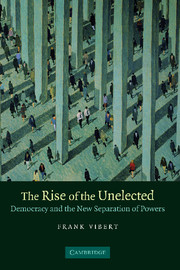Book contents
- Frontmatter
- Contents
- List of boxes, tables and figures
- Acknowledgements
- Introduction
- 1 The world of the unelected
- 2 The driving forces
- 3 The advantages of the new separation of powers
- 4 The challenge to conventional democratic theory
- 5 Adapting traditional approaches
- 6 The new separation of powers and the advent of the informed citizen
- 7 Informed citizens and the changing role of traditional institutions
- 8 The legitimacy of the new branch
- 9 The new separation of powers and the European Union
- 10 International institutions: blurring the boundaries
- 11 Conclusions: the accountability of the new branch
- Appendix: List of unelected bodies referred to in the text
- Bibliography
- Index
5 - Adapting traditional approaches
Published online by Cambridge University Press: 22 September 2009
- Frontmatter
- Contents
- List of boxes, tables and figures
- Acknowledgements
- Introduction
- 1 The world of the unelected
- 2 The driving forces
- 3 The advantages of the new separation of powers
- 4 The challenge to conventional democratic theory
- 5 Adapting traditional approaches
- 6 The new separation of powers and the advent of the informed citizen
- 7 Informed citizens and the changing role of traditional institutions
- 8 The legitimacy of the new branch
- 9 The new separation of powers and the European Union
- 10 International institutions: blurring the boundaries
- 11 Conclusions: the accountability of the new branch
- Appendix: List of unelected bodies referred to in the text
- Bibliography
- Index
Summary
Conventional accounts of democracy are severely challenged by the new separation of powers, but there are three recent adaptations to the leading accounts of democracy that offer a way of placing the rise of the unelected within mainstream theory.
The first, and most widely accepted, account emphasises the continuation of a ‘democratic overhead’ that links the new institutions with the old through what is known as ‘principal–agent theory’. This account is consistent with the theories of participatory democracy. The proposed link between the old institutions and the new gives a continued function and meaning to participating in traditional forms of democracy relying on the old elected institutions.
A second account adapts traditional approaches to the rule of law by emphasising the relevance of a new type of constitutionalism. This new style of constitutionalism attempts to bring the unelected bodies within the scope and definitions of the rule of law by extending the coverage of constitutions.
A third account argues that the content of democratic politics is changing and that the rise of the new institutions taps into a shift in what people want out of systems of government. This shift is away from political ideology towards pragmatic solutions to practical problems. Unelected bodies, including courts, are a beneficiary of this shift in the subject matter of democracies, but at the same time they retain and encourage the essential deliberative qualities of reason and civility.
- Type
- Chapter
- Information
- The Rise of the UnelectedDemocracy and the New Separation of Powers, pp. 69 - 85Publisher: Cambridge University PressPrint publication year: 2007



